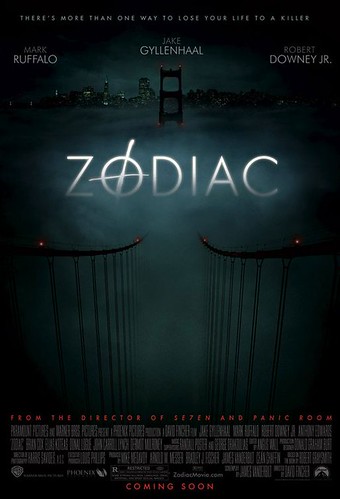
Starring Jake Gyllenhaal, Mark Ruffalo, Robert Downey Jr., Anthony Edwards, Brian Cox, Elias Koteas, Donal Logue, John Carroll Lynch, Dermot Mulroney
Directed by David Fincher
Official Web site
When director David Fincher’s “Se7en” opened in 1995, it seemed to inspire so many copycat movies that the serial killer storyline became a sub-genre all its own. So the marriage of Fincher with the true-life story of the Zodiac killer who terrorized northern California in the late ‘60s and early ‘70s would seem to be a natural fit. Indeed, the director has shown a propensity of building his career filming dark stories with tortured characters. So his selection of material here is hardly a surprise. But what is the real surprise is in his presentation of “Zodiac,” choosing to tone down his typical visual flair behind the camera, while serving up a story that is his most developed and cerebral to date.
Based on a book by Robert Graysmith, a former cartoonist at the San Francisco Chronicle during the Zodiac’s reign of terror, Fincher and screenwriter James Vanderbilt have crafted a compelling and gripping movie that keeps only a peripheral vision on the killer himself. Its primary focus is on those that were left to piece together the aftermath of the Zodiac’s crimes – namely San Francisco police detectives David Toschi (Mark Ruffalo) and William Armstrong (Anthony Edwards), along with reporter Paul Avery (Robert Downey Jr.) and Graysmith (Jake Gyllenhaal).
Spanning a time frame of more than 20 years and filled with a huge cast, “Zodiac” is meticulous in its depiction of the crimes, which were recreated according to police reports. Yet, Fincher (who certainly knows a thing or two about depicting violence on screen) shows a measured amount of restraint in filming the murders, demonstrating the swiftness such violent action can have. For all intents and purposes, the movie’s violence quotient essentially drops off the charts by about a third of the way through its expansive two hour, 40-minute running time.
By the time detectives Toschi and Armstrong report to the seemingly unexceptional crime scene of a murdered cab driver in the Presidio Heights section of San Francisco, the Zodiac has already been involved in the attacks on at least four other people, killing two of them. To this day, the number of murders the killer is actually responsible for is a source of disagreement between various law enforcement agencies and the press.
The San Francisco media was already on the trail of the Zodiac by this time, as the killer wrote several letters to local newspapers, urging them to run them along with cryptic ciphers that he said would reveal his identity. Graysmith, while not directly involved with the case, becomes obsessed with discovering the Zodiac’s identity, choosing to hound crime reporter Avery to pick up any clues he can. Played by Downey with a jaded weariness fueled by alcohol and drugs, Avery is at first amused and even impressed with Graysmith’s tenacity at helping. But as time passes and the leads in the case grow cold, Avery’s temperament becomes increasingly sour.
Of course, that description could apply to more than one person connected with investigating the Zodiac case, as an endless number of potential suspects, false leads and a general lack of physical evidence at the crime scenes conspire to keep the case open. The movie has no qualms at jumping ahead in time, moving weeks, months and in one visually arresting sequence, years into the future (depicted with a time lapse construction of the city’s Transamerica building). Characters move in and out of the picture with the passage of time, as the failure at cracking the case take its toll.
Graysmith obsession with the case eventually breaks up his marriage and ends his employment at the paper, as he spends all his time pouring through old press clippings and police reports about the crimes. Meanwhile, Tocci (who was the basis for Steve McQueen in “Bullitt”) has to fend off Graysmith’s persistent questions, as he realizes the odds the case will ever be closed shrink with each passing day.
It’s as much a credit to the actors involved, as it is with Fincher and Vanderbilt that any kind of suspense can be generated from a movie in which a criminal investigation is burdened by frustration and disappointment. Imagine an episode of “Law and Order” that never gets to the “order” part and you can see the difficulty involved. That’s not to say that the case has no forward momentum, as “Zodiac” clearly makes a case against Arthur Leigh Allen (John Carroll Lynch), a hulking pedophile with a calm demeanor. But the investigation’s lack of any evidence beyond circumstantial poses endless amounts of roadblocks.
The cast is uniformly excellent, providing strong, but not showy work, in keeping with the low-key style of the film. Ruffalo and Edwards both are quite convincing in their roles as the dutiful, but increasingly frustrated cops (who actually never draw their guns in the movie – what a genuine surprise), while Gyllenhaal demonstrates a man in true tunnel vision, practically leaving common sense and his own safety in his rearview mirror.
“Zodiac” is a film that can frustrate, to be sure, but it also can stimulate the mind. It’s a movie approaching three hours in length that actually didn’t feel quite long enough. And no, it doesn’t really have a satisfying conclusion, but considering the actual state of the case today, it’s an ending that’s as true to life as you can get.
Grade: A-
(Rated R for some strong killings, language, drug material and brief sexual images.)
No comments:
Post a Comment